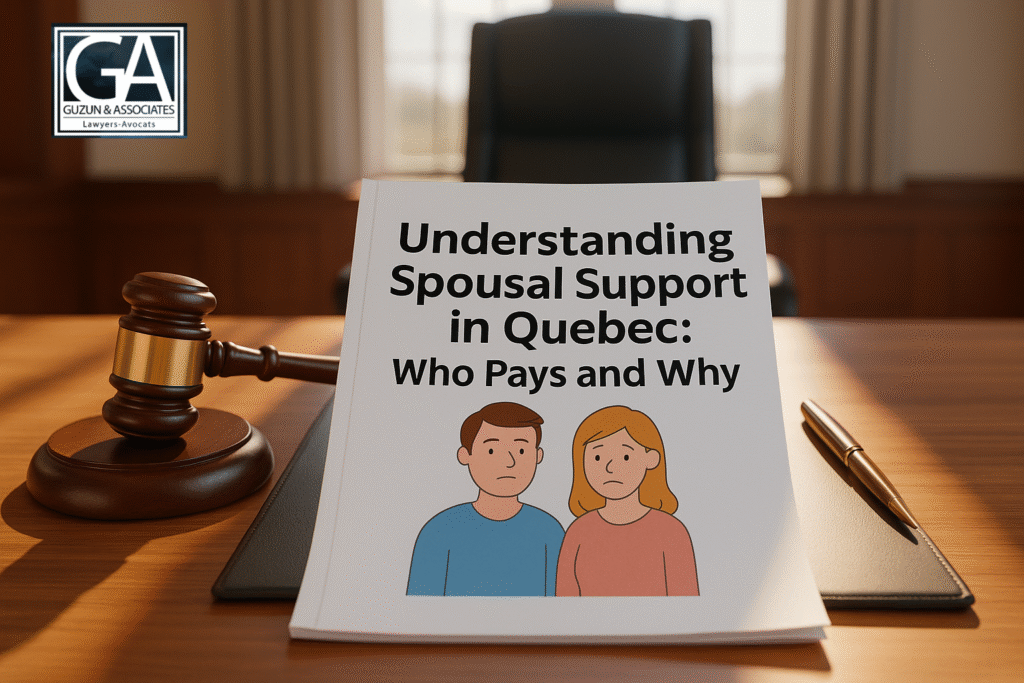Understanding Spousal Support in Quebec: Who Pays and Why
Understanding Spousal Support in Quebec: Who Pays and Why

In Quebec, the end of a marriage or civil union does not necessarily bring immediate financial independence for both spouses. Often, one partner has maintained a steady career and income, while the other has stepped back from professional growth to care for children or manage the household. This creates an economic gap that does not disappear the moment the relationship ends. Spousal support, also known as alimony, is the legal mechanism designed to close that gap and ensure fairness after separation.
As a Montreal family lawyer, I am often asked: “Do I really have to support my ex after separation?” The answer is not automatic. Courts examine each case carefully, but the guiding principle remains the same: spousal support exists to prevent unjust hardship, not to penalize one spouse for the breakdown of the relationship.
A Real Case From My Practice
I once represented a husband after a 15-year marriage. He was the main earner, while his wife had stayed home to raise their two children. When the marriage ended, he thought paying child support would be sufficient. But the court recognized that his wife had lost years of earning capacity.
We negotiated spousal support for a fixed period, giving her the resources to retrain and re-enter the workforce, while keeping the payments reasonable for him. This balanced approach avoided trial and gave both parties a clear plan forward.
Who Can Claim Spousal Support in Quebec?
Not every separation involves spousal support, but a spouse may have the right to claim it if :
- They are financially weaker compared to their former partner.
- They contributed to the household or to their partner’s career in non-financial ways.
- They need support to transition toward financial independence.
Spousal support is available after a marriage or a civil union, but not after a de facto (common-law) union unless a contract exists.
When Courts Are Likely or Unlikely to Award Spousal Support
| Situation | Court Likely to Award Support | Court Unlikely to Award Support |
| Long Marriage or Civil Union | Spouse left workforce for many years, clear economic imbalance. | Short relationship with little financial interdependence. |
| Childcare Contributions | One spouse sacrificed career to raise children or manage the home. | Both spouses maintained careers and shared childcare equally. |
| Earning Disparity | One spouse earns significantly more and the other has limited prospects. | Both spouses have similar incomes and earning capacity. |
| Transitional Needs | Support requested for a limited time to retrain or study. | Spouse already financially independent at separation. |
| Health or Disability | One spouse cannot work full-time due to health issues. | No health concerns and full ability to work. |
Lawyer’s insight: Courts look at fairness and balance. They will not grant support just because one spouse asks. There must be a clear financial disadvantage linked to the relationship itself.
How Courts Decide the Amount
In Quebec, there is no rigid formula for calculating spousal support. Instead, judges weigh several key factors to reach a fair outcome:
- Length of the marriage or civil union.
The longer the relationship, the stronger the case for support. A short union rarely justifies long-term payments, while a marriage of 10, 15, or 20 years may establish a real economic dependency that cannot be ignored. - Income and earning potential.
Courts look not only at what each spouse earns today but also at their future prospects. If one spouse is financially secure and the other has limited career opportunities after years away from the workforce, support becomes more likely. - Contributions during the relationship.
Financial income is not the only factor. Raising children, managing the household, or supporting a spouse’s career are treated as valuable contributions that justify compensation when the union ends. - Needs compared to ability to pay.
A fair balance is always the goal. The court examines what the receiving spouse truly needs to live with dignity and transition to independence, while ensuring the paying spouse is not left in financial hardship.
Lawyer’s insight: Spousal support turns on proportionality, not punishment. Courts aim to recognize the sacrifices made during the relationship while avoiding unrealistic or punitive obligations.
Common Misconceptions
- “Spousal support is forever.” In many cases, it is temporary and rehabilitative, designed to give the weaker spouse time to rebuild independence.
- “Child support covers everything.” Wrong. Child support belongs to the child, while spousal support addresses economic fairness between adults.
- “If my ex works, they cannot get support.” Not true. Even a working spouse may qualify if their income is far below what they reasonably gave up during the marriage.

Why Legal Advice Matters Early
Disputes over spousal support are some of the most sensitive in family law. What begins as a simple conversation can quickly turn into a costly conflict if expectations are unclear or if agreements are not properly documented. Early legal advice makes all the difference. It allows you to:
- Confirm if support is justified.
Not every spouse is entitled to support. A lawyer can evaluate your situation against Quebec law and set realistic expectations from the start. - Prepare the right financial disclosure.
Courts require detailed proof of income, expenses, and assets. Having these documents organized early strengthens your position and avoids delays. - Negotiate fair and sustainable terms.
A clear legal framework reduces tension and protects both sides. Agreements reached with legal guidance are more likely to be approved by the court and respected over time.
From my practice: I have seen couples make informal promises – either to pay support or to waive it. Later, when circumstances changed, those promises had no legal weight. The result was months of litigation and unnecessary expense. A properly structured agreement from the beginning would have saved both sides time, money, and stress.
Conclusion: Plan Ahead, Protect Your Future
Spousal support in Quebec is not automatic, but when justified, it can make the difference between hardship and stability. The key is preparation, evidence, and understanding the law.
At Guzun & Associates, we help clients in Montreal and across Quebec navigate these sensitive cases with strategy and clarity.
📞 Call us at +1 (514) 842-7414
📧 Email us at office@avocatguzun.com
📍 Meet us in our Old Montreal office or schedule an online consultation.
With the right legal advice, you can protect your financial future and approach separation with confidence.
